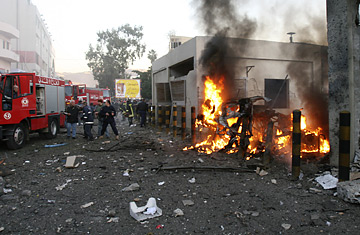
Firemen work to extinguish a burning car at the site of an explosion in Beirut, Lebanon, that targeted a U.S. Embassy vehicle.
Tuesday's car bomb attack on U.S. embassy vehicle in northern Beirut was relatively ineffective by today's gruesome standards of political violence: The blast killed four people and wounded 20, but none of the American diplomats who were its presumed targets was harmed. Even so, as the first attack targeting U.S. officials in Lebanon since the end of the civil war in 1990, the bombing will send a nervous shudder through the small but growing American community in Beirut.
The U.S. embassy confirmed that two embassy security employees, both Lebanese, had been in the vehicle at the time of the explosion, and that one of them had suffered a minor injury. "The Embassy is outraged that there are still those who work to undermine Lebanon's stability through murder and intimidation," the statement said. "The Lebanese people deserve to live in peace and security in an independent and united Lebanon."
The target of Tuesday's attack may have marked it as a turning point in the campaign of political violence that has racked Lebanon since 2004, but the spectacle was grimly familiar: The acrid stench of smoke, the crunching of shattered glass underfoot, pools of black oil from destroyed vehicles, smeared gouts of congealing blood, wide-eyed and angry soldiers and police thrusting back crowds of journalists and onlookers. The car suspected of carrying the bomb was a twisted sculpture of fire-blackened steel. A second car, containing the bodies of two of the victims, appeared to have taken the brunt of the explosion as it tried to pass the embassy vehicle. A third body, limbs blasted to bloody stumps, lay facedown on the road. To the east, the snow-capped peak of Mount Sannine turned blood red as the sun dipped below the Mediterranean, leaving the Lebanese to ponder the implications of yet another attempted assassination.
The Lebanese capital had been bracing for further violence, amid a political impasse that shows no sign of ending despite the mediation efforts of France last month and the Arab League over the past week. Amr Musa, the Arab League secretary-general, is set to return to Beirut Wednesday for another attempt to cajole the bickering Lebanese into accepting the League's proposal to elect a new President and form a national unity government. Few expect him to succeed. Egypt's President Hosni Mubarak warned on Monday that patience with the feuding Lebanese is running out, and said that if the Arab League proposal founders, "everyone will wash their hands of Lebanon and the country will be lost and no one can know what its future will be."
The rising tension also portends an end to the relatively carefree life enjoyed by Americans here. Lebanon is one of the most tolerant and cosmopolitan countries in the Middle East, and arguably the prettiest. But it's a tougher place for U.S. diplomats, who live in a fortified hillside compound just north of the capital that they rarely leave, and never without bodyguards. Top officials travel in convoys of armored vehicles, which sometimes break up into decoy mini-convoys to confuse would-be attackers. One of the rumors floating around the bomb scene this evening was that the target vehicles were in fact part of such a decoy convoy.
The Embassy's strict security precautions are the legacy of hard lessons. In 1976, Palestinian gunmen kidnapped and killed Francis Meloy, a newly arrived U.S. ambassador, before he could even present his credentials. Seven years later, nearly 300 Americans were killed in suicide truck bomb strikes against the embassy and the U.S. Marine barracks near Beirut airport. The U.S. blames the militant Shi'ite Hizballah for those attacks, as well as for the kidnappings of dozens of foreigners during the 1980s — charges the Lebanese group has always denied. Still, those attacks reflected the reality that a civil war that began as an internal power struggle between Christians and Muslims had quickly became a proxy battle between regional and Cold War rivals. While the U.S. Marines might have seen their mission as keeping the peace, some Lebanese and their regional sponsors perceived the American troops as part of a power play. Stability was finally restored when Washington green-lighted Syria's heavy-handed enforcement of the peace.
Today, the United States is once again ensnared in an internal Lebanese political struggle that has become a proxy fight between regional powers, this time pitching the U.S. and Israel against Syria and Iran. Washington has certainly made some powerful enemies in the course of Lebanon's recent upheavals: it used its influence in the U.N. Security Council to help expel Syrian troops from Lebanon in 2005, backed Israel in the 2006 summer war against Hizballah, supported the government of Prime Minister Fouad Siniora in the face of massive opposition demonstrations, and accused Syria of masterminding the string of bombings and assassinations plaguing the country for over three years.
Against that backdrop, it may have been only a matter of time before the U.S. became a target in Lebanon once again. As to whether or not the latest attack marks a return to the bad old days for Americans in Beirut, the answer may lie in the outcome of efforts to break Lebanon's political stalemate.
